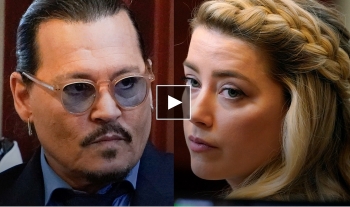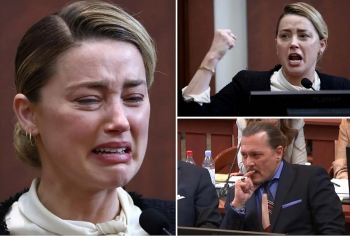Full Text of Washington Post's Article Written by Amber Heard in 2018
 |
| The Washington Post Article by Amber Heard |
Updated: The Jury sides with Johnny Depp in libel lawsuit, Amber Heard on counterclaim. Read Here!
What did Amber Heard Actually Write in the Washington Post Article in 2018?
In mid-April 2022, the lawsuit between Johnny Depp and Amber Heard officially started and attracted all the attention of world public opinion. The lawsuit focuses on a 2018 Washington Post article written by Amber Heard.
Johnny Depp sued his ex-wife for defamation even though the article did not mention the actor's name. The actor "Pirates of the Caribbean" demanded $ 50 million in compensation because he thought that the article caused his career to go downhill.
The 36-year-old actress denied lying and accused her ex-husband of being an abusive and addicted person. Amber Heard accused Depp of organizing campaigns that caused her to lose her film and advertising contracts, and lose $50 million.
Amber Heard's 2018 Washington Post article was titled "I spoke up against sexual violence — and faced our culture’s wrath. That has to change".
The article begins with Amber Heard mentioning how she endured violence since childhood.
And She went on to say that she had been “harassed and sexually assaulted by the time I was of college age.”
Amber Heard emphasized that she has changed her perspective on domestic violence since 2016 when she became a victim of this.
In the post, Amber Heard revealed, her friends advised her not to say these things because they could affect her career in Hollywood. Amber Heard also addressed the movement to protect women from abuse #MeToo.
The actress also mentioned the gender inequality in the film industry in which she is active. "I've seen how organizations protect men accused of abuse. Imagine a powerful man like a ship, like the Titanic. That ship is a huge business. When it hit an iceberg, there were many people on board desperate to patch the holes, not because they trusted or even cared about the ship, but because their fate depended on the business.
In recent years, the #MeToo movement has taught us about how power works, not just in Hollywood but in all kinds of institutions such as workplaces, faith centers or singles simply community groups. In every walk of life, women are faced with men "pumped" by social, economic and cultural power. And these institutions are starting to change."
In addition to having trouble at work, in the article, Amber Heard also mentioned being bullied on social networks, losing freedom and being disturbed in daily life.
In the Washington Post piece, Heard claimed that friends had told her that taking on such a public position meant she wouldn’t work again as an actor and that she would be blacklisted. Heard alleged that this turned out to be true, claiming she had been recast in one movie and dropped by a global fashion brand.
The lawsuit between Amber Heard and Johnny Depp has lasted 6 tense weeks and the jury is expected to reach a final conclusion on May 31 (US time). However, after two days of deliberation, the jurors were still unable to reach an agreement. They plan to work an extra day and will make an announcement on June 1 (US time).
Before those present at the trial, judge Penney Azcarate of the trial between Amber Heard and Johnny Depp emphasized: "Based on the title, not the whole article."
According to the judge, focusing on the 2018 article was seen as the core issue of the trial. Judge Penney Azcarate also warned the jury to consider each piece of evidence carefully, not jumping to conclusions.
The post 4 years ago is making Amber Heard's life completely change. In just the past 6 weeks, the actress has suffered from the reaction and criticism of the world public when the details of her married life with Johnny Depp were exposed.
While most of the opinions said that Johnny Depp proved to be honest and trustworthy, Amber Heard was labeled with names such as "liar", "mine digger"... The actress was ostracized by the community. online when more than 4.3 million people signed a petition to remove her from the Aquaman 2 project.
Many people who have worked with a star couple such as doctors, nurses, neighbors, and security personnel supporting Johnny Depp, said they had never seen the actress show signs of abuse. Amber Heard admitted hitting her ex-husband but with the aim of self-defense and to protect her sister. Heard's sister, Whitney, is the only witness who claims to have seen Depp beat her sister.
Check out the Full Text of Washington Post Article by Amber Heard in 2018
(Amber Heard is an actress and ambassador on women’s rights at the American Civil Liberties Union)
I was exposed to abuse at a very young age. I knew certain things early on, without ever having to be told. I knew that men have the power — physically, socially and financially — and that a lot of institutions support that arrangement. I knew this long before I had the words to articulate it, and I bet you learned it young, too.
Like many women, I had been harassed and sexually assaulted by the time I was of college age. But I kept quiet — I did not expect filing complaints to bring justice. And I didn’t see myself as a victim.
Then two years ago, I became a public figure representing domestic abuse, and I felt the full force of our culture’s wrath for women who speak out.
Friends and advisers told me I would never again work as an actress — that I would be blacklisted. A movie I was attached to recast my role. I had just shot a two-year campaign as the face of a global fashion brand, and the company dropped me. Questions arose as to whether I would be able to keep my role of Mera in the movies “Justice League” and “Aquaman.”
I had the rare vantage point of seeing, in real time, how institutions protect men accused of abuse.
Imagine a powerful man as a ship, like the Titanic. That ship is a huge enterprise. When it strikes an iceberg, there are a lot of people on board desperate to patch up holes — not because they believe in or even care about the ship, but because their own fates depend on the enterprise.
In recent years, the #MeToo movement has taught us about how power like this works, not just in Hollywood but in all kinds of institutions — workplaces, places of worship or simply in particular communities. In every walk of life, women are confronting these men who are buoyed by social, economic and cultural power. And these institutions are beginning to change.
We are in a transformative political moment. The president of our country has been accused by more than a dozen women of sexual misconduct, including assault and harassment. Outrage over his statements and behavior has energized a female-led opposition. #MeToo started a conversation about just how profoundly sexual violence affects women in every area of our lives. And last month, more women were elected to Congress than ever in our history, with a mandate to take women’s issues seriously. Women’s rage and determination to end sexual violence are turning into a political force.
We have an opening now to bolster and build institutions protective of women. For starters, Congress can reauthorize and strengthen the Violence Against Women Act. First passed in 1994, the act is one of the most effective pieces of legislation enacted to fight domestic violence and sexual assault. It creates support systems for people who report abuse, and provides funding for rape crisis centers, legal assistance programs and other critical services. It improves responses by law enforcement, and it prohibits discrimination against LGBTQ survivors. Funding for the act expired in September and has only been temporarily extended.
We should continue to fight sexual assault on college campuses, while simultaneously insisting on fair processes for adjudicating complaints. Last month, Education Secretary Betsy DeVos proposed changes to Title IX rules governing the treatment of sexual harassment and assault in schools. While some changes would make the process for handling complaints more fair, others would weaken protections for sexual assault survivors. For example, the new rules would require schools to investigate only the most extreme complaints, and then only when they are made to designated officials. Women on campuses already have trouble coming forward about sexual violence — why would we allow institutions to scale back supports?
I write this as a woman who had to change my phone number weekly because I was getting death threats. For months, I rarely left my apartment, and when I did, I was pursued by camera drones and photographers on foot, on motorcycles and in cars. Tabloid outlets that posted pictures of me spun them in a negative light. I felt as though I was on trial in the court of public opinion — and my life and livelihood depended on myriad judgments far beyond my control.
I want to ensure that women who come forward to talk about violence receive more support. We are electing representatives who know how deeply we care about these issues. We can work together to demand changes to laws and rules and social norms — and to right the imbalances that have shaped our lives.
*****
 What will Happen to Depp and Heard After the Verdict? What will Happen to Depp and Heard After the Verdict? What happens next to Johnny Depp and Amber Heard after trial and final verdict? |
 What is The Final Verdict of Depp vs Heard Trial: A Symbolic Judgment! What is The Final Verdict of Depp vs Heard Trial: A Symbolic Judgment! Updated: The seven-person civil jury (five men, two women) returned to begins deliberations in Johnny Depp-Amber Heard trial (May 31) after a three-day weekend. |
 How to Fake Cry Immediately with Hollywood 'Tear Stick' How to Fake Cry Immediately with Hollywood 'Tear Stick' The social media has been flooded with accusations that Amber Heard is “fake crying”. How to cry immediately like Hollywood actors? |
 Full List of Amber Heard's Lovers Before & After Johnny Depp Full List of Amber Heard's Lovers Before & After Johnny Depp Who has Amber Heard dated? Her full dating and marriage timeline before and after she married Depp, including a rumored threesome with Elon Musk |























